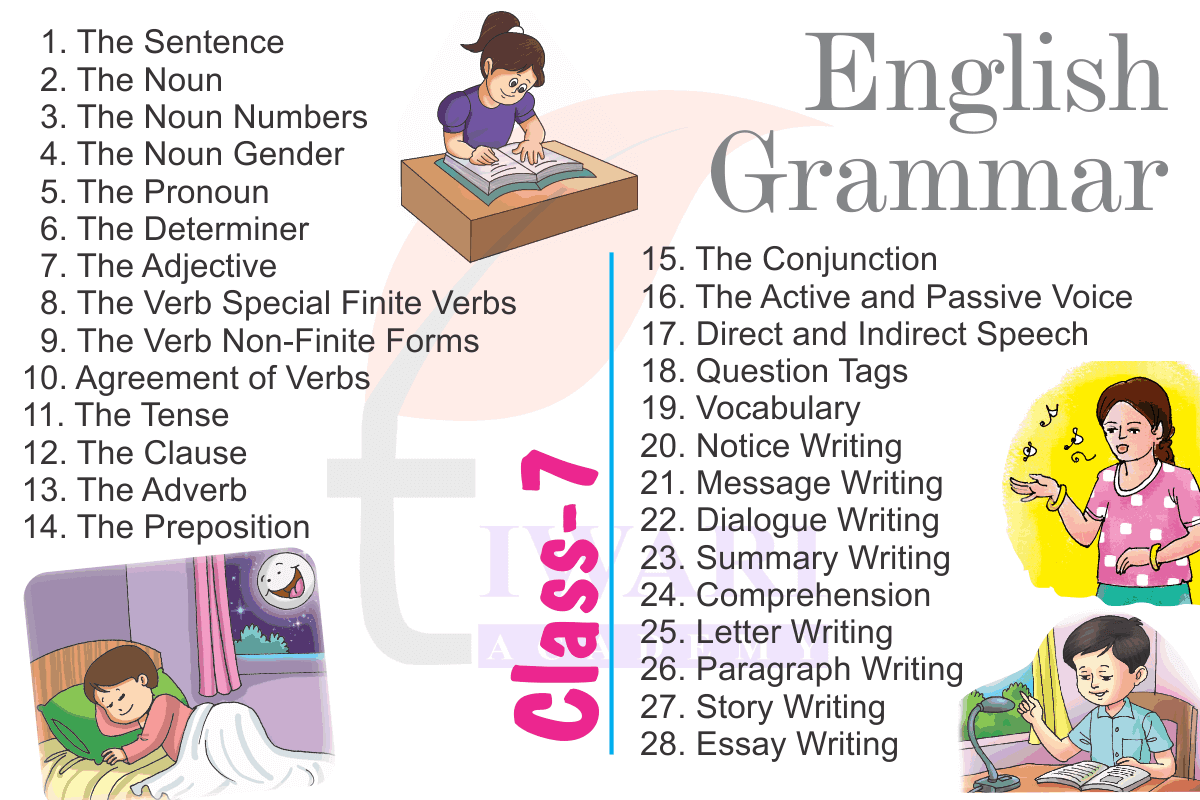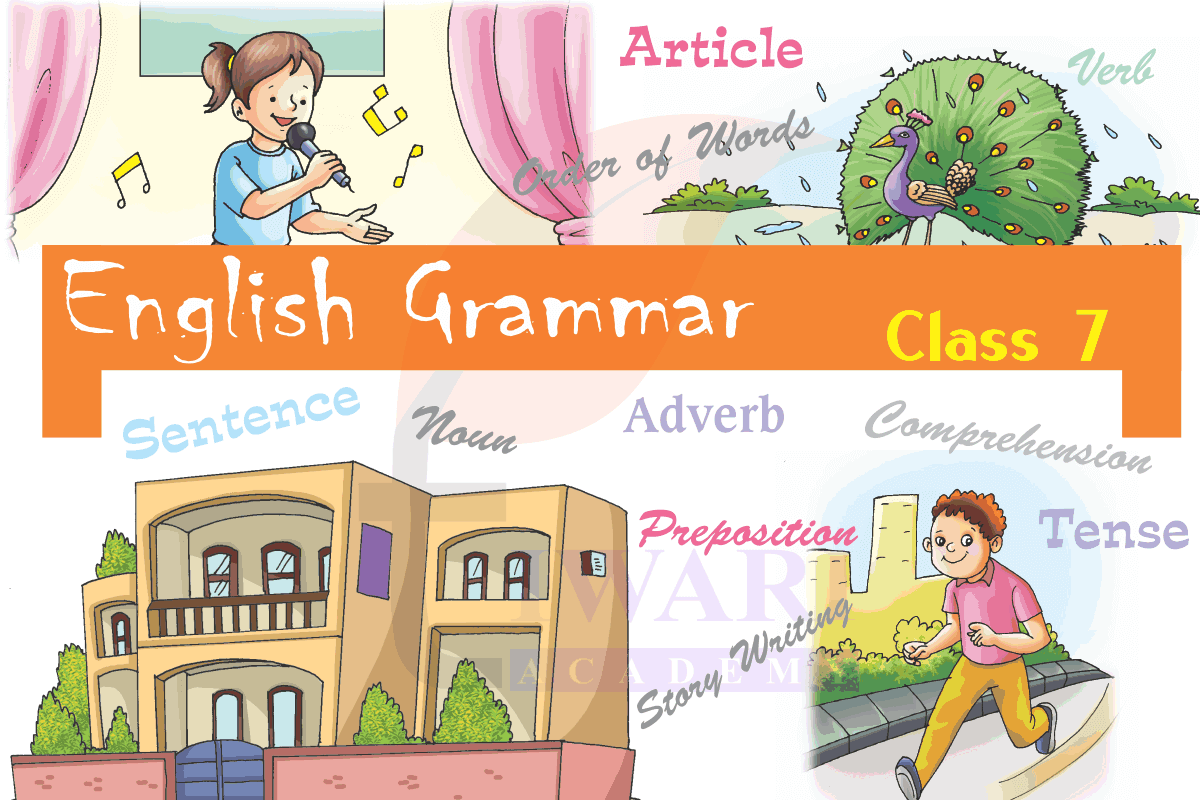NCERT Solutions for Class 7 English Grammar all chapters are given below. All the contents are updated for academic session 2024-25. This grammar portion for standard 7 includes about the Sentences, Noun and their Number or Gender, the Pronoun, Determiner, Adjective, Special- Finite Verbs, Non-Finite Forms, Agreement of Verbs with the Subject, Tenses, the Conditional Clause, Adverb, Preposition, Conjunction, Active and Passive Voice, Direct and Indirect Speech, Question Tags or Tail Questions, Vocabulary, Notice Writing, Message Writing, Dialogue Writing, Summary Writing, Comprehension (Unseen Passage), Letter Writing, Paragraph Writing, Story Writing, Essay Writing.
Class 7 English Grammar all Chapters
Chapter 1. The Sentence
Chapter 2. The Noun
Chapter 3. The Noun Numbers
Chapter 4. The Noun Gender
Chapter 5. The Pronoun
Chapter 6. The Determiner
Chapter 7. The Adjective
Chapter 8. The Verb Special Finite Verbs
Chapter 9. The Verb Non-Finite Forms
Chapter 10. Agreement of Verbs
Chapter 11. The Tense
Chapter 12. The Clause
Chapter 13. The Adverb
Chapter 14. The Preposition
Chapter 15. The Conjunction
Chapter 16. The Active and Passive Voice
Chapter 17. Direct and Indirect Speech
Chapter 18. Question Tags
Chapter 19. Vocabulary
Chapter 20. Notice Writing
Chapter 21. Message Writing
Chapter 22. Dialogue Writing
Chapter 23. Summary Writing
Chapter 24. Comprehension
Chapter 25. Letter Writing
Chapter 26. Paragraph Writing
Chapter 27. Story Writing
Chapter 28. Essay Writing
Reviews can uncover errors, inaccuracies, or typos in study materials. Correcting these mistakes ensures that students are not misled and that the content is reliable. Your feedback is valuable for us.
| Class 7 All Subjects iOS App for iPad & iPhone |
Please provide Review and Suggestion to make new contents. If reviewers find that certain topics are insufficiently covered, they can recommend adding more content or going into greater depth on specific subjects.
English Grammar content for Class 7 at Tiwari Academy typically covers a wide range of topics to help students develop a strong foundation in the English language. In Class 7 English Grammar students can expect to find comprehensive lessons on essential grammar concepts such as parts of speech, tenses, sentence structure, and punctuation. These lessons are often presented in a user-friendly and easy-to-understand format, making it accessible for students of all levels. Tiwari Academy’s resources may include explanations, examples, and practice exercises to reinforce learning.
Class 7 English Grammar All Chapters for 2024-25
Tiwari Academy provides downloadable worksheets and study materials to help students practice and master the English grammar topics covered in Class 7. These materials can be invaluable for students looking to improve their grammar skills and excel in their English studies. Class 7 English Grammar at Tiwari Academy aims to provide a structured and comprehensive learning experience to help students build a strong foundation in English grammar, which is crucial for effective communication and academic success.
| Class: 7 | English Grammar |
| Textbooks: | Topics wise book and Revision Book |
| Contents: | Study Material with Examples |
| Session: | 2024-25 |
| Content Type: | Text, Images and Videos |

Learning the terms of English grammar in Class 7 holds significant importance for several reasons. It lays the groundwork for effective communication. Understanding grammar terms such as nouns, verbs, adjectives, and conjunctions helps students construct clear and coherent sentences. This foundational knowledge is essential for expressing thoughts, ideas, and emotions accurately, both in spoken and written communication. Without a grasp of these terms, students may struggle to convey their thoughts effectively, leading to misunderstandings and hindered communication skills.
Chapter wise important points for Class 7 English Grammar
The Sentences
A clause is a sentence which is the part of a larger sentence. A declarative statement always ends in full stop (.). The special verbs in English are: is, am, are, was, were, has, have, had, do, does, did, shall, will,
should, would, can, could, may, might, must etc. An Interrogative sentence always ends in a question mark (?).
Learning grammar terms in Class 7 contributes to academic success. As students progress in their education, their coursework becomes more complex, and written assignments become a common part of assessments. Proper grammar is crucial for writing essays, reports, and research papers. It not only enhances the quality of their writing but also reflects positively on their academic performance. By understanding terms like subject-verb agreement, tense, and sentence structure, students can produce well-structured and grammatically correct pieces of writing, which are highly valued in educational settings.
The Noun
We cannot put a, an or a number before uncountable nouns. Names of instruments that have two parts are written in plural: scissors, tweezers. Names of some games are in plural: droughts, billiards.
A solid grasp of grammar terms is essential for professional and career development. In the future, students will enter the workforce where effective communication is paramount. Job applications, interviews, and workplace interactions all require proficient communication skills.
A strong foundation in grammar provides a competitive edge, as it ensures clarity and professionalism in written communication, which is often a reflection of one’s competence and attention to detail. Overall, learning grammar terms in Class 7 not only benefits students in their immediate academic pursuits but also sets them on a path to success in their future careers and personal lives.

The Noun: Number
Only countable nouns have plural forms. Singular countable nouns can be made plural usually by adding the suffix. When nouns are not preceded by numerals, we can use their plural forms. For example: I have several pairs of shoes.
The Noun: Gender
Collective nouns such as army, people, nation, flock, class and group are used to signify the collection or group of living things, they are classified as neuter gender.
Teaching English grammar to Class 7 students can be made engaging and easy to understand by using simple and relatable methods. One effective way to teach grammar is through storytelling. Choose a short, interesting story or create one, and then identify and discuss different grammar elements within the story. For example, you can point out nouns by highlighting the characters’ names or verbs by discussing the actions they take. This helps students relate grammar to real-life situations and makes learning more enjoyable.
The Pronoun
There are three important cases of Personal Pronoun. They show the relation of pronouns to other words in the sentence. My, our, your, her, his, its and their are Possessive Determiners. They are not used alone. Always a noun follows them.
Turn grammar lessons into fun games and activities. For instance, you can play Grammar Bingo, where students have bingo cards with various grammar terms like nouns, verbs, adjectives, and they mark them off as you discuss them in the lesson. Or use flashcards with sentences on them, and students can take turns identifying the subject and predicate or finding the correct verb tense. These interactive activities make grammar learning interactive and memorable.
The Determiner
Some vowels have a consonant sound. We use the article with noun (or adjective) that begin with these words. Some words begin with an h that we do not hear when we say the word. We use an with nouns (or Adjectives) that begin with a silent h.
The Adjective
We often use than when we compare two things or people. When we use the superlative form, we often use the before it.
Visual aids like diagrams, charts, and posters can be very helpful for visual learners. Create colourful posters illustrating different parts of speech, and use mnemonic devices or acronyms like FANBOYS (for coordinating conjunctions) to help students remember concepts easily. Associating a visual element or a catchy phrase with grammar rules can make them stick in the students’ minds.



